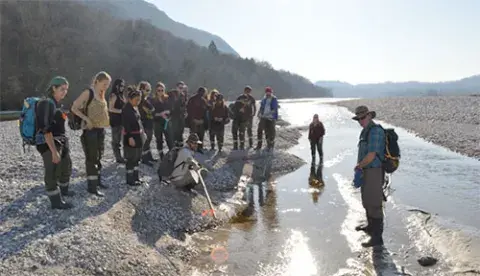
It’s no surprise that post-Academic Travel, FUS students often return to exchange stories and learnings. One Academic Travel course in particular this semester provided students with an exceptional hands-on experience on the Italian floodplains.
Professor Patrick Della Croce, Assistant Professor of Biology and Environmental Sciences, led the spring 2015 "Academic Travel, where students observed, collected, and tested samples of groundwater organisms as a way to practice what they learned in their classes.
The travel course focused on the characteristics of freshwater systems. One of the highlights of the course was the time spent on the floodplain of the Tagliamento river, the only remaining river in the Alps that, according to Professor Della Croce, is unconstrained and uncontrolled from the source to the mouth. Once there, students were able to collect their own samples and bring them back to the hotel for further study. "It's a very non-traditional experience," explained FUS student Elena McGuire, Class of 2017, majoring in Environmental Studies with an Emphasis in Science and International Management, "you wear boots that go up to your thighs and splash around as you take discharge and velocity measurements. It was a great experience, and we all bonded as a group while applying what we learned in class out on the river. It was fun."
During the trip, the students also explored other areas and discovered more about the region. "While we did have a good amount of time working in the river, we also took the time to get to know northeastern Italy and Slovenia. We visited castles, tried archery, ate a lot of homemade gelato, enjoyed gondola rides in Venice, and wandered through the most incredible caves," Elena continued. "Everybody loved the caves," noted Professor Della Croce.
On its second run as a full 3-credit course, the travel will be offered again in the near future. According to Professor Della Croce, its hands-on portion provides excellent opportunities to explore floodplain and groundwater ecology in practice. "It’s one thing to talk about something like floodplain ecology exclusively in class," he explained, "and another thing to do it on a floodplain where they can see it, live it, and experience it. There is no doubt that teaching floodplain ecology on Europe's best floodplain is by far the better option."

